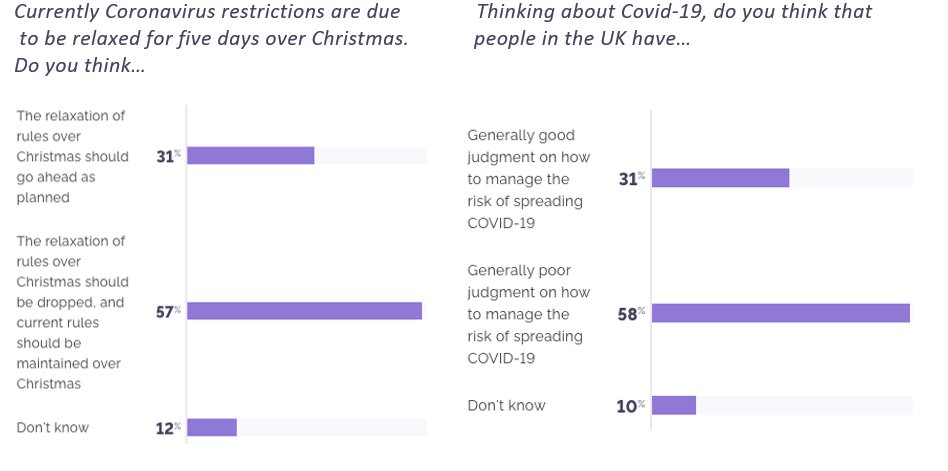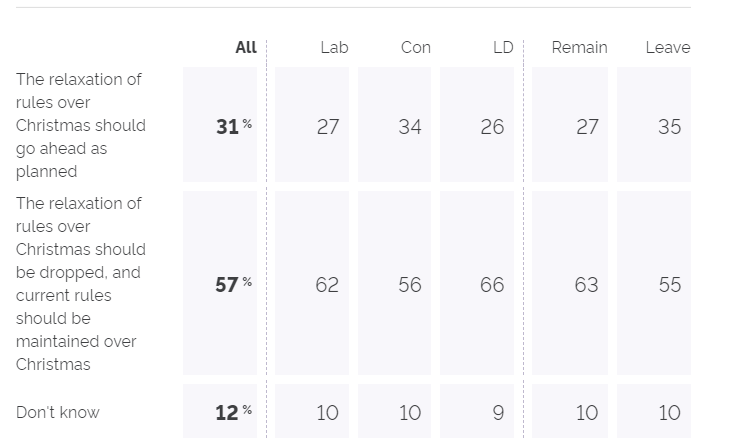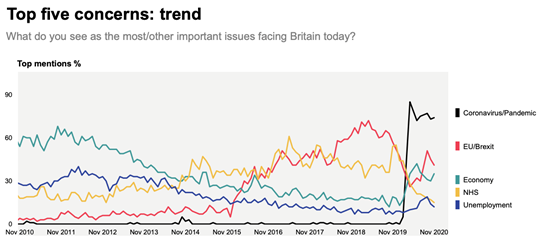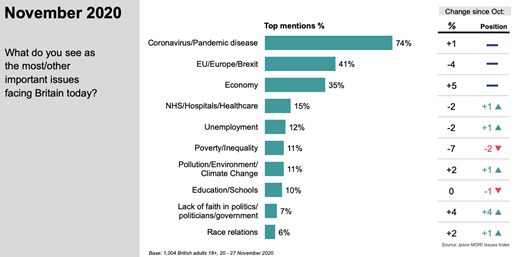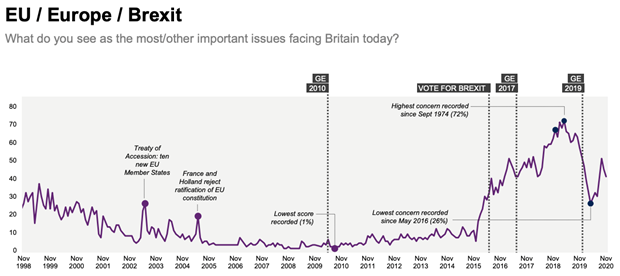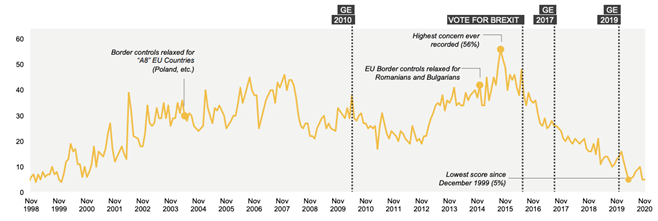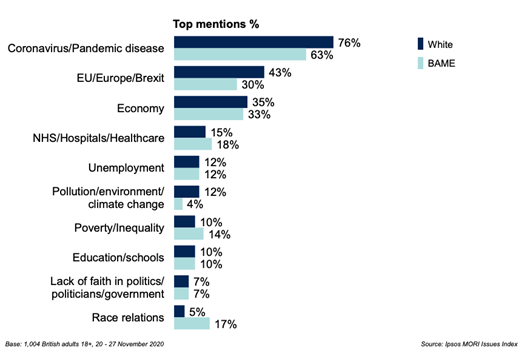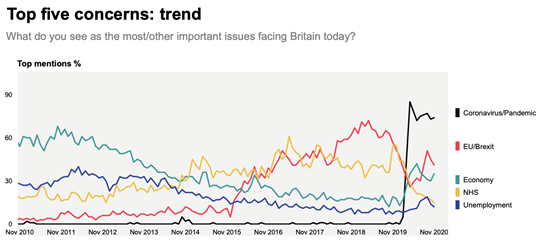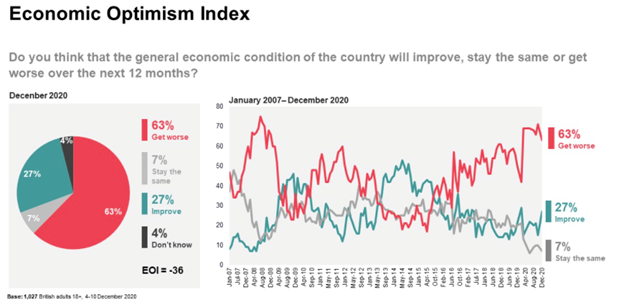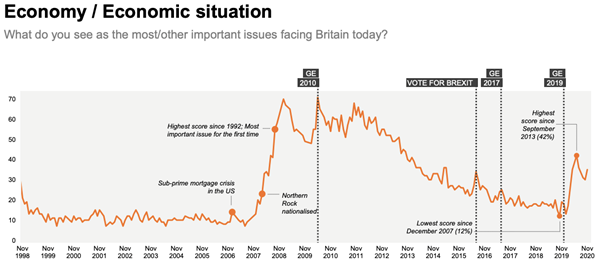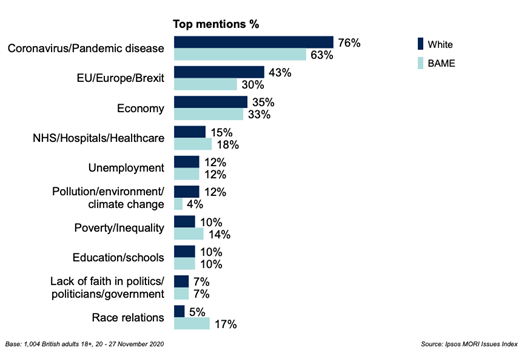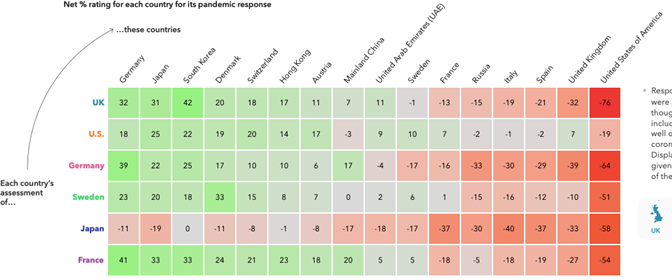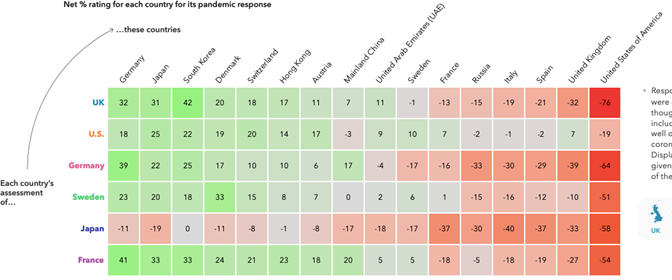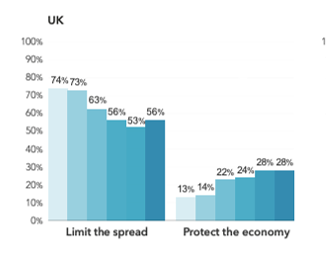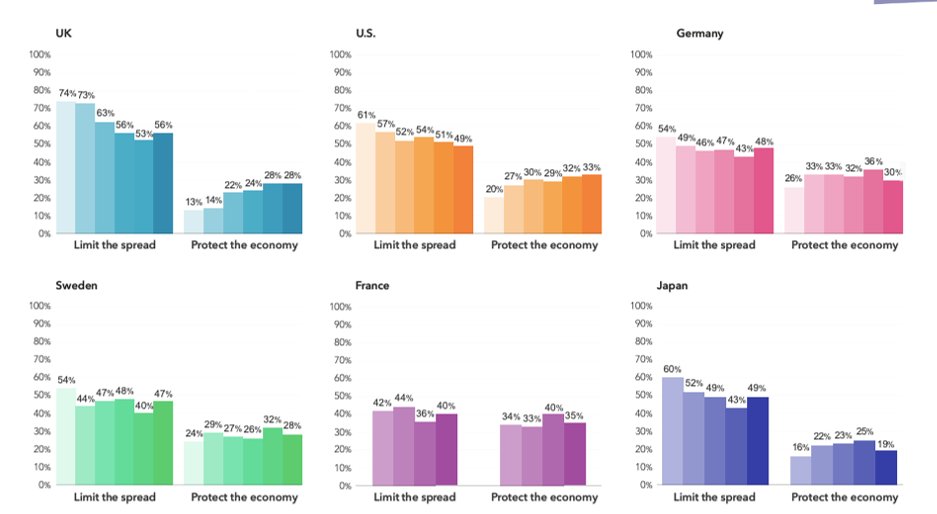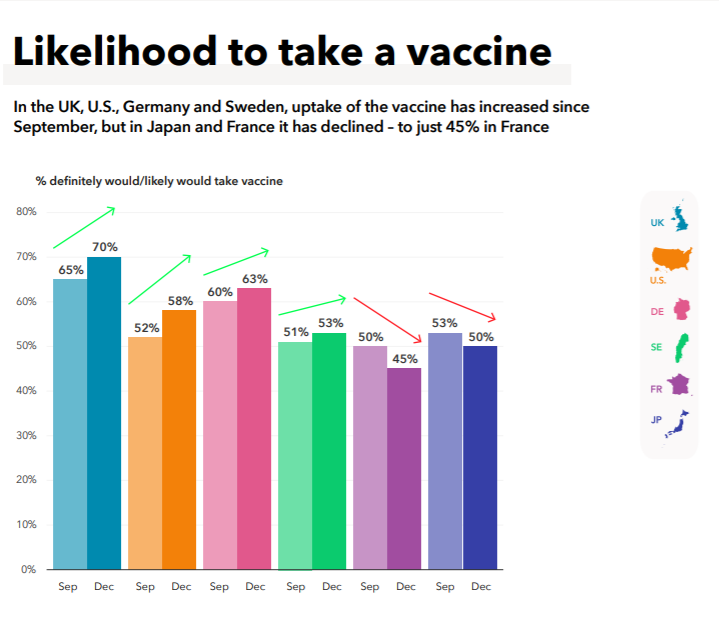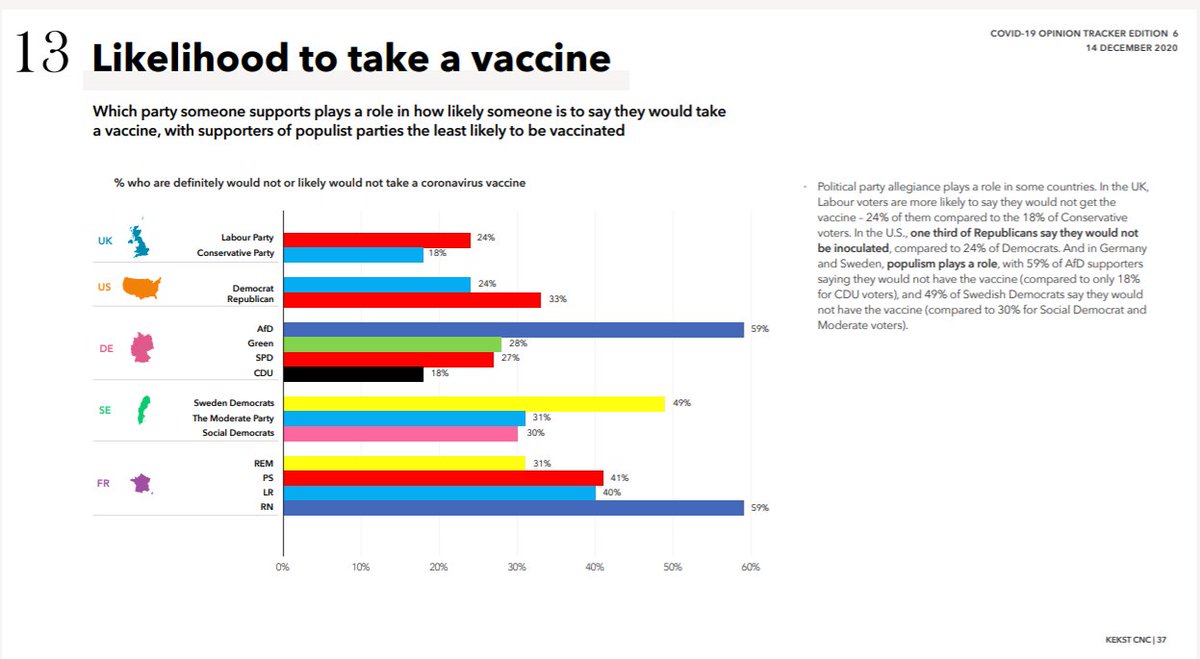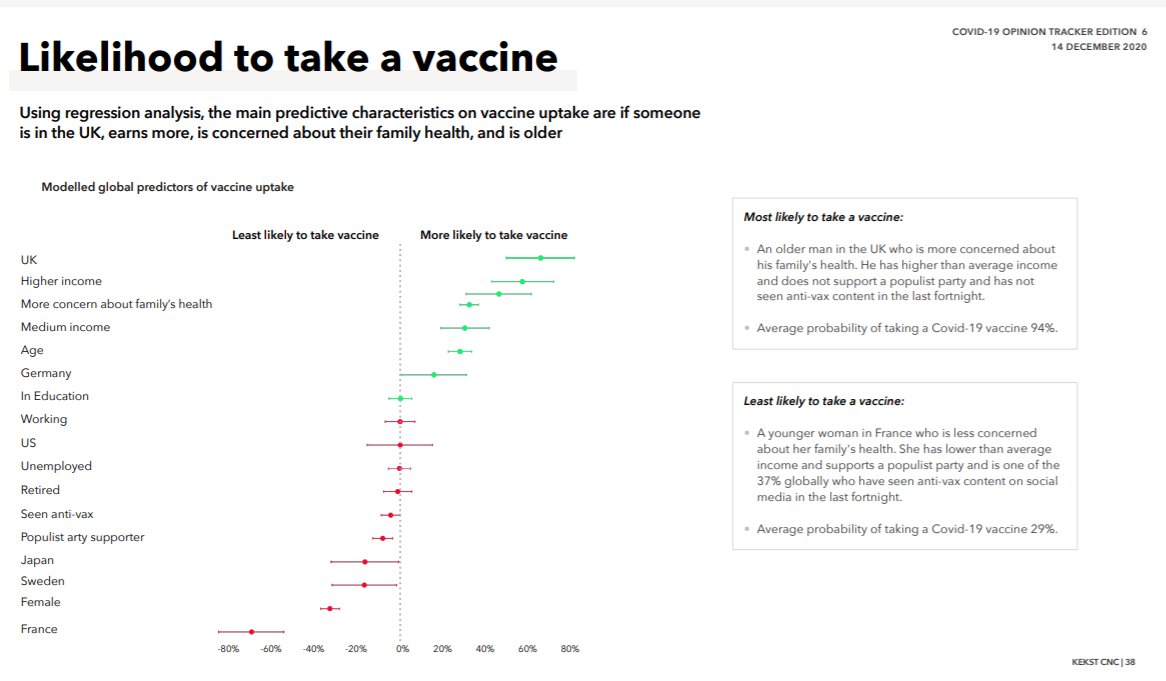Final Covid attitudes memo of 2020: no 37
- Christmas spirit only slightly dampened, but doubts about relying on public to manage risks
- UK ranks high for vaccine appetite; low for Covid performance
- Immigration salience down to lowest level this century
https://www.britishfuture.org/wp-content/uploads/2020/12/BFCovidAttitudes37.pdf
- Christmas spirit only slightly dampened, but doubts about relying on public to manage risks
- UK ranks high for vaccine appetite; low for Covid performance
- Immigration salience down to lowest level this century
https://www.britishfuture.org/wp-content/uploads/2020/12/BFCovidAttitudes37.pdf
7/10 people are looking forward to Christmas, but 1/4 people aren't. (Ipsos-Mori suggest Covid is worth a 10% swing to the Grinch Party, leaving a clear majority for a more modestly celebrated Christmas).
Concerns about affording Christmas appear to be very similar to non-pandemic years. (Perhaps Christmas restrictions and the economic downturn offset each other).
Ipsos-Mori found the country evenly split over the Christmas relaxations (fieldwork was 4th-10th December)
- 49% thinking the rules should be tighter
- 49% thinking the balance about right/too tight.
[But there simply isn't time for a referendum on this]
https://www.ipsos.com/ipsos-mori/en-uk/half-believe-christmas-coronavirus-measures-not-strict-enough
- 49% thinking the rules should be tighter
- 49% thinking the balance about right/too tight.
[But there simply isn't time for a referendum on this]
https://www.ipsos.com/ipsos-mori/en-uk/half-believe-christmas-coronavirus-measures-not-strict-enough
By contrast, YouGov found a 57% to 31% support for ditching Xmas relaxations (Dec 16th). Aligns closely with 31% who think people generally have good judgement about managing Covid risks vs 58% who think people have poor judgement about personal behaviour and managing the spread
- A very flat regional, gender profile of views.
- Slightly higher ABC1 (33%) than C2DE (27%) support for relaxing the Christmas rules
- Biggest demographic factor is 7/10 over 65s wouldn't relax the rules, while 1/5 would do so
- Slightly higher ABC1 (33%) than C2DE (27%) support for relaxing the Christmas rules
- Biggest demographic factor is 7/10 over 65s wouldn't relax the rules, while 1/5 would do so
Quite minor political differences. YouGov found 55%-56% for ditching the relaxation among Conservative and Leave voters, with 62%-63% among Labour and Remain voters. So slightly more support for govt policy from govt supporters, but dampened by caution from age profile.
Final Ipsos-Mori monthly issues index of year in long-run context
- Year of Covid, obvs; Economy/Brexit compete 2nd/3rd.
- Perhaps counterintuitive that public salience of NHS fell across this year: peak was during 2019 election rather than the pandemic, fell more since summer
- Year of Covid, obvs; Economy/Brexit compete 2nd/3rd.
- Perhaps counterintuitive that public salience of NHS fell across this year: peak was during 2019 election rather than the pandemic, fell more since summer
Public priorities now.
- Covid 74% dominates
- Economy 35% and rising
- Brexit 41% but deadline for these inconclusive talks about the deal, whether fish could be sorted, regulatory alignment etc hadn't fully gripped an exhausted public by time of this Nov 20th-27th fieldwork
- Covid 74% dominates
- Economy 35% and rising
- Brexit 41% but deadline for these inconclusive talks about the deal, whether fish could be sorted, regulatory alignment etc hadn't fully gripped an exhausted public by time of this Nov 20th-27th fieldwork
So we might anticipate one more spike in EU/Brexit salience for December/January. For the very last time? May depend on the outcome & what follows from it.
Immigration ranks 12th as 2020 ends.
5% have it as a top 3 issue. It is the top priority for 1%
This is the lowest public salience for immigration for over 20 years - indeed since this 21st century began - with a similar score to December 1999.
5% have it as a top 3 issue. It is the top priority for 1%
This is the lowest public salience for immigration for over 20 years - indeed since this 21st century began - with a similar score to December 1999.
Race relations is 10th (on 6%). It ranks much higher with ethnic minority respondents (17%), just behind the NHS. Race is in 5th place for ethnic minority respondents. There is some expectation there that talk should turn to action in 2021 after this year of anti-racism protests.
*If* the vaccine rollout does go well ...
*If* a Brexit deal was sorted ....
we might anticipate 2021 as a kaleidoscope-shifting year for the issues index, esp by the second half of the year. The economy seems a natural focus, but may be more room at the top of the priority list.
*If* a Brexit deal was sorted ....
we might anticipate 2021 as a kaleidoscope-shifting year for the issues index, esp by the second half of the year. The economy seems a natural focus, but may be more room at the top of the priority list.
Many people are gloomy about the economy in 2021
63% think economic conditions will be worse in 12 months time; growing minority 27% who think they will be better are likely to be right (since we've lost 8% of GDP this year) if take the question literally as about 12 months time
63% think economic conditions will be worse in 12 months time; growing minority 27% who think they will be better are likely to be right (since we've lost 8% of GDP this year) if take the question literally as about 12 months time
I expect many people are thinking about a difficult 3-6 months ahead (esp given rising concern about the third wave). But it does seem likely that 2021 could become a year in which the economy is more central to politics, after an unusual decade in which it was often overshadowed
Public concern about unemployment began 2020 at a 12 year low, before rising to be the public's 4th priority by September. The furlough scheme had very broad public support: extending furloughing has somewhat mitigated public concerns for now.
Climate change could emerge as a highly salient issue of 2021. Climate campaigners should worry about its low salience with ethnic minorities (4% rather than 12%). The generational profile of the ethnic minority population (considerably younger) makes this an esp poor score.
Ethnic minority breaks as a standard feature of Issues Index is a new thing in 2020.
- Shows pollsters can get there
- Good example of why visibility vs invisibility can matter for share of voice, to make an issue/challenge visible to policy-makers, to media or civic society.
- Shows pollsters can get there
- Good example of why visibility vs invisibility can matter for share of voice, to make an issue/challenge visible to policy-makers, to media or civic society.
Kekst have produced several comparative studies across the year. This (slightly complicated) table shows that the UK public share a view across countries that the US response to Covid has been worst, and that the UK has struggled a bit more than others.
Little evidence of national exceptionalism about Covid (among publics)
- certainly not in UK,
- Japanese more self-critical
- Swedes, Germans mildly more positive
- US less negative about own performance & about others, so still rank it last
- Spanish unimpressed by everyone
- certainly not in UK,
- Japanese more self-critical
- Swedes, Germans mildly more positive
- US less negative about own performance & about others, so still rank it last
- Spanish unimpressed by everyone
This is Covid spread/economic risk as a trade-off (April, May, June, July, Sept, December) in the UK. A slight rebalancing of priorities over time, checked by second wave, but with clear priority of preventing the spread.
In comparative context, the UK public (with the Japanese) have been consistently more sceptical about the idea that there is a trade-off here: mitigating economic risks seen much more a question of policy balance in France, and in Germany, the US and Sweden than in the UK
- Comparing June to Dec, publics are considerably less impressed by Germany than we were (though it is still ranks top). This suggests a fair amount of public attention to changes in the international picture.
- Softening of (previously very negative) views of Chinese handling
- Softening of (previously very negative) views of Chinese handling
Willingness to take a vaccine: UK has the broadest support, increasing since September. This is a consistent feature across comparative studies, as is the higher rate of scepticism in France.
UK's comparative pro-vaccine views are rarely mentioned in UK discourse
* maybe because risks of anti-vax sentiment & online misinformation are excitingly newsworthy while pro-vaccine sentiment is boring
* UK views more pro-science than German/French opinion counter-intuitive
* maybe because risks of anti-vax sentiment & online misinformation are excitingly newsworthy while pro-vaccine sentiment is boring
* UK views more pro-science than German/French opinion counter-intuitive
Who are the vaccine sceptics & the vaccine hesitant?
Often, young women are more likely to be sceptical.
This differs across country:
- Biggest gender gap in Sweden (but in UK too)
- Class is a big vaccine divide in France, but not UK
- Age profile is reversed in Japan,
Often, young women are more likely to be sceptical.
This differs across country:
- Biggest gender gap in Sweden (but in UK too)
- Class is a big vaccine divide in France, but not UK
- Age profile is reversed in Japan,
Populist politics is a significant issue for vaccine up-take, among Swedish, German and French voters for populist right parties.
In UK, Labour voters more hesitant than Conservatives. (Much of this is an age effect). Vaccines are much less politically polarising here.
In UK, Labour voters more hesitant than Conservatives. (Much of this is an age effect). Vaccines are much less politically polarising here.

 Read on Twitter
Read on Twitter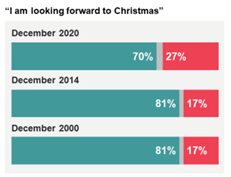
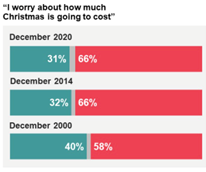
![Ipsos-Mori found the country evenly split over the Christmas relaxations (fieldwork was 4th-10th December) - 49% thinking the rules should be tighter- 49% thinking the balance about right/too tight.[But there simply isn't time for a referendum on this] https://www.ipsos.com/ipsos-mori/en-uk/half-believe-christmas-coronavirus-measures-not-strict-enough Ipsos-Mori found the country evenly split over the Christmas relaxations (fieldwork was 4th-10th December) - 49% thinking the rules should be tighter- 49% thinking the balance about right/too tight.[But there simply isn't time for a referendum on this] https://www.ipsos.com/ipsos-mori/en-uk/half-believe-christmas-coronavirus-measures-not-strict-enough](https://pbs.twimg.com/media/Epl2lt3XcAAQNd6.png)
